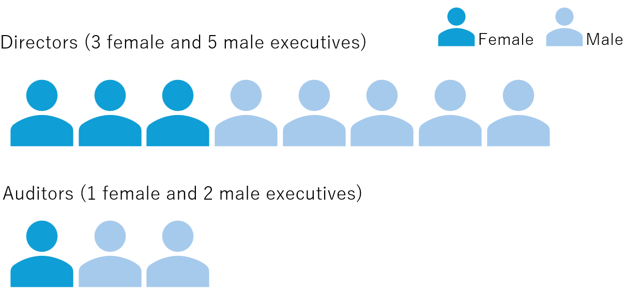The Daiwabo Group firmly believes that diverse talent is indispensable for our sustainable growth. In line with this belief, our personnel management is dedicated to creating an environment where diverse individuals can thrive. We achieve this by providing career development and skill-building programs based on the Group Corporate Code of Conduct. We prioritize the health and safety of our employees while valuing diversity and accommodating the unique needs of each individual in our workplace. The group respects and accepts diversity within and outside the workplace, aiming to become an organization that builds a truly valuable future together with society.
With three women appointed as outside directors, the group’s achievement has continued to be recognized in the MSCI Japan Empowering Women Index (WIN) as of June 2024.
Gender composition in the top management of Daiwabo Holdings

However, our top management personnel portfolio, which has supported business expansion, is predominantly male. To build a well-diversified organization in line with our future business strategies, we recognize the need for a medium- to long-term approach. We created a road map to systematically facilitate the participation of women, and the group set a target of raising the proportion of female managers to 3% or higher by FY2030. We have already adopted a policy of hiring and promoting employees regardless of gender, and will continue to encourage the participation and improve the retention rate of women. We anticipate, however, that it will take roughly 15 years to see a significant improvement in the percentage of women in managerial positions since most of the female employees in the group are relatively young. Besides promoting internal recruitment of female managers, we are also reforming our corporate culture and implementing a step-by-step process of building an environment that will encourage female employees to focus on career development and advancement, as well as actively recruiting female talent from outside the company. Positioning our targets for 2030 as only a milestone on the way to further progress in this area, from a longer-term perspective, we will be undertaking further discussion aimed at realizing steady, continued growth in the share of managers who are women, and will be implementing further measures to promote women’s participation.
● Shortened work schedule for parenting is provided longer than the legal requirement
● Diversity management training provided
● Target ratio of women in new hires
Some of our business units are experiencing lower rate of employment of persons with disability due to resignations and other reasons, while companies with large number of employees maintain an employment ratio above the legal requirements. We plan to collaborate with public institutions such as Hello Work, an employment service center operated by Japanese government, and actively hire individuals with disabilities.
We are exploring the optimal allocation of the retiring workforce and their job duties by extending the employment period beyond the current retirement age of 60, in addition to reemploying those who have reached retirement age. Especially, we are seeking the optimal assignment of retiring-age employees on a group-wide level, with an emphasis on transferring their technical knowledge and expertise to ensure a smooth succession process. As the retirement age is expected to increase in the future, we need to reevaluate the current system to ensure workforce stability, particularly regarding job assignments after employees retire from their current positions at a certain age.